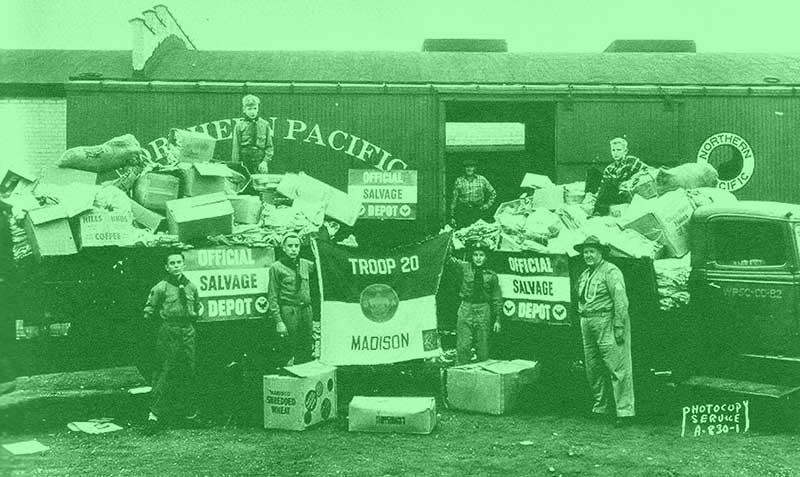Civilizations evolution was shaped by the discovery of metals. The knowledge of metallurgy gave man the ability to build tools and weapons that played an essential role in the advancement of transport and agriculture.

Since the dawn of time, man has been recycling and re-using our planet’s finite resources. From re-using clothing to melting tools to make new ones, getting the most out of these resources has helped shape our history.
Historical Facts About Recycling
Man has been melting and re-melting metal since 7000BC – Perhaps a nugget of pure copper, or perhaps a finished copper tool, falls into the hotcamp fire . The copper melts. When it cools, it is found to have solidified in a new shape. The magic metallurgy is born.- The Chinese have been re-melting metal since 2500BC. Between 50 and 100AD, they learned how to make rice paper, used for writing, making handkerchiefs, parasols, clothing
and windows. It is often reused. - Built in 282BC the Colossus of Rhodes was cast partly of recycled bronze. It toppled into the
harbour following an earthquake but was recovered and recycled by the Turks 900 years later.

- The Hanging Gardens of Babylon were built around 600BC on terraces, the base of which was often covered with sheets of reclaimed lead soldered with tin.
- The blocks used to build the pyramids of Egypt around 2550BC were cut using chisels made of copper hardened by beating. Thee were handed in every day for hardening and regrinding; once they became too short, they were re-melted.
- References to the recycling of metal have been discovered on clay tablets in Mesopotamia and on inscriptions in Egypt.
- Some of the Seven Wonders of the World are made partly or entirely from Seventh Resource (recycled) materials.
- The printing press had a greater impact on the recycling industry than any other invention – as letters were melted down every few days.
- The Statue of Liberty is covered with 80 tonnes of partly recycled copper and bronze plating
ans was shipped in pieces from France to the US. - Geoffrey Chaucer (1340-1400) the “father of British literature” – author of “The Canterbury Tales” – worked in the recycling sector. In 1389, he was appointed as “Clerk of the King’s Works at the Tower of London and Westminster Palace”. His job was to manage and keep accounts of the old metals and rags collected on the order of the king.
We’ve Come a Long Way
Conservation and recycling became important in our society throughout history. Economic depressions made recycling a necessity for many people to survive.
The success of recycling improved the economics of recycling and laws requiring recycling collections.

